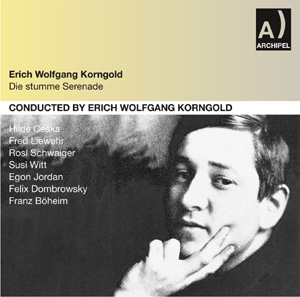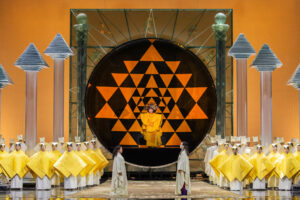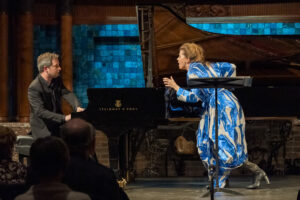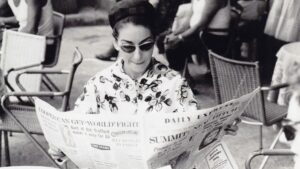
Vienna never really forgave Erich Wolfgang Korngold for going to work in the movies. When the exiled composer returned from Hollywood after World War 2 to mount a comeback, he was dismissed as a has-been who all too eagerly cast off high art for the commercialism of the silver screen.
Korngold, it must be said, led with his chin by bringing for the occasion Die stumme Serenade (The Silent Serenade), an hybrid opera-Cabaret that mixes elements of golden age film music with high fructose arias, skittering orchestral accompaniments and other démodé effects as comforting as a serving of Mohr im Hemd. A city by then eager to turn the page and dabble in modernism sneered at the confection, sending Korngold sulking back to California, where he spent his final years miserable and in poor health.
The work sat neglected for more than a half century until it was revived for the 50th anniversary of the composer’s death, in 2007. A recording of the abridged 1951 Radio Vienna premiere now available on Archipel reveals a sentimental piece devoid of much symbolism or bite that mixes old-style melodies with modern rhythms in an intimate package that could have made a half-decent Depression-era film. (The full 180-minute version premiered in Dortmund in 1954).
The work’s biggest weakness as a musical drama is a convoluted plot that went through multiple revisions and may prove elusive to anyone without a good command of German. Silvia Lombardi, ad actress and fiancée of the prime minister in 19th century Naples, is accosted in the night by an amorous intruder who turns out to be her dressmaker, Andrea Coclé. Almost simultaneously, a bomb is planted under the prime minister’s bed. Andrea is persuaded by a bumbling police chief to take the fall for the assassination attempt and narrowly escapes a death sentence. After a series of plot twists, he is exonerated and reunited with Sylvia, who by then realizes that he’s the man she really loves.
Nearly half of the 100-minute performance is spoken dialogue, and Archipel’s failure to include a libretto or plot outline will leave some in the dark about what is happening at any given moment. The skip button may be the best way to cut through the chatter, though one runs the risk of missing some winsome entr’actes.
More substantial material such as the overture and Silvia’s Act 1 “Freund, du lebst vorbei am Gluck” wouldn’t sound out of place in a 1920s Berlin cabaret, with their modern dance idioms and stepwise harmonic progressions. The Act 2 interview duet “Sei nicht so indiskret!” between the secondary couple Sam and Louise is a study in savvy timing and sensitivity to dialogue, though one could do without the cartoon kiss sound effects.
Among the principals, Hilde Ceske is an appealing Silvia, bending her kittenish voice to follow the contours of Korngold’s ripe phrases and only turning a bit screechy at the very top. She’s overshadowed in some ensemble scenes by Rösl Schwaiger, a distinguished Mozartean from the 1940s and 1950s, who nails Louise’s coloratura passages without a hint of effort.
Fred Liewehr, more an actor than a singer and a veteran of Vienna’s Burgtheater, gamely essays Andrea’s “Ich seh dein Bild vor mir” in a silky matinee idol kind of way but sounds a little inhibited by stylistic correctness. Kurt Preger is an uninspired police chief whose only standout moment is in the patter song “War ich ein Verbrecher.” Franz Böheim doesn’t fare well vocally as Sam, sounding unsupported and warbly.
On the podium, Korngold draws a committed performance from the nine-piece chamber orchestra, whose dual pianos and percussion section give the work an nostalgic vibe. The rubbery, rubato-laced meters carry the whiff of carefree Europe between the wars while prominent themes such as the upward surging five-note pattern in the overture are repeated and tweaked throughout the work to reflect dramatic turns. Korngold may have had complicated feelings about modern music but his harmonic language, even in lighter fare such as this, is pretty advanced and at certain moments veers toward expressionism.
One suspects the creator of Die tote Stadt and Violanta was trying to cope with change by creating a cheerfully romantic work built on Old World aesthetics. While it missed its intended audience by at least a couple of decades, Die stumme Serenade could tap some contemporary listeners’ nostalgia for a bygone era, as well as contribute to a clear-eyed reassessment of Korngold’s output.


























Comments